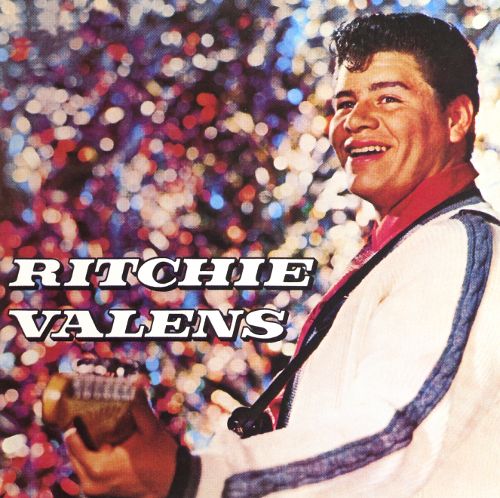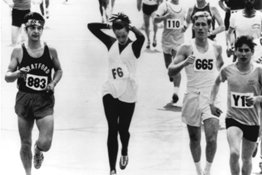It is the late 1950’s in southern California, and a young superstar named Ritchie Valens, whether he knows it or not, is about to change the culture of America forever. In a matter of eight months, the Hispanic student at San Fernando High School just became one of the biggest celebrity musicians of the day.1 After dropping out of school in order to record and tour full time, Richard Valenzuela was making phenomenal Rock N’ Roll music, both on stage and in the studio. While America quickly became obsessed with the undeniably talented teen, nothing could prepare them for his next release.
From the beginning, the odds were against young Richard. He was merely sixteen, and, as a young Latino, there were few opportunities for someone like him in the American mainstream music industry, let alone in Rock ’n Roll. He saw proof of this fact early in his career, facing prejudice and discrimination at every turn. He was even forced to change his name to Ritchie Valens in order to make it easier for his fans to pronounce—a compromise that gave way to controversy and anger from his family.2 Ritchie realized that, even though he was opposed to the changing of his name, it would be a smart move for him as a musician. But even after his family name was taken from him, he refused to let go of his heritage. In fact, it seemed that he tightened his grip.
Ritchie wanted to do something to pay tribute to his Latino culture. With the assistance of Bob Keane of Del-Fi Records, he decided he would combine the two worlds that he was now so heavily a part of, by turning the Spanish tune “La Bamba” into an upbeat rock song. Only knowing English, Ritchie had to learn the lyrics of the traditional Mexican folk song phonetically. After countless takes in the studio, he recorded the song on a two-track record with a second soon-to-be hit Oh, Donna.3
Ritchie released the track and promptly shook up America. Most people had no idea what the song was about, but, for one of the first times in modern music history, they didn’t care. The charismatic rhythm of the song combined with Ritchie’s unique voice; it was impossible to dislike it, and the song spread like wildfire, taking his career to new heights.
Seeing Ritchie perform was a spectacle only few Americans were graced with. His energy and impeccable guitar skills would engage the thousands of audience members from start to finish.4 While the crowd was swooning over every single song, there was nothing like that epic guitar riff that carries the tune of La Bamba.3 As soon as Ritchie’s guitar pick hit his strings, the fans simply could not contain themselves.

Unfortunately, Richard Valenzuela’s career was ended even quicker than it begun. Soon after his explosive rise to fame was sparked, and before he could finish his tour, Ritchie Valens was killed in a plane crash along with fellow artists Buddy Holly and The Big Bopper J.P. Richardson.6 The tragedy triggered nation-wide shock, and the day became known by many as “The Day The Music Died.”7
Although his life was ended much too early, perhaps it was this terrible fate that immortalized him in music history. His music and the rest of Valens’ amazing life inspired the film La Bamba, a timeless and classic film. Ritchie’s brave move in the release of “La bamba” inspired and enabled many other Hispanic artists to begin to make their way into the spotlight, making it much more than just a great song. We see the repercussions still today, through modern Latin Rock bands and all the sub-genres surrounding them, and will without a doubt continue to experience the fruits of the song for decades to come. Needless to say, American music and culture would not be the same without Richard Valenzuela’s audacious contributions.
- Encyclopedia of World Biography, 2004, s.v. “Ritchie Valens.” ↵
- Salem Press Biographical Encyclopedia, January 2017, s.v. “Ritchie Valens,” by Scot M. Guenter. ↵
- “‘La Bamba’ one of the 100 most important American musical works of the 20th century,” Broadcast Transcript. Weekend All Things Considered, NPR, July 15, 2000. ↵
- St. James Encyclopedia of Popular Culture, 2nd ed. “Valens, Ritchie (1941–1959),” Candida Taylor. ↵
- “‘La Bamba’ one of the 100 most important American musical works of the 20th century,” Broadcast Transcript. Weekend All Things Considered, NPR, July 15, 2000. ↵
- Robert Wright, “The Day The Music Died,” Aviation Safety, July 1, 2015. ↵
- “What Went Wrong On The Day Music Died?” Interview by Robert Siegel, Melissa Block, All Things Considered, NPR, February 3, 2009. ↵



163 comments
Luisa Ortiz
La Bamba is that song that your grandparents your parents and you know by heart because is catchy and upbeat! Reading this article I got “Selena vibes” how both artists come from Latin culture and both did not speak Spanish originally until they started singing, also both artist are loved and admire by no just the Mexican-American culture but as well as the Anglo community and both sadly had a tragic death at such a young age! Thank you for adding the video of this song it was so cool reading the article and listening to the song as well!
Lyzette Flores
Ever since I was little I would always hear this song at party’s and it would always put me in a great mood. I was very shocked while reading this article because I had no idea of many things about him. For instance, his name. It’s crazy how he changed his name so his fans wouldn’t have trouble pronouncing it. Honestly, that shows how passionate and dedicated he was to the role of music.
Daniela Martinez
La Bamba is such a timeless song that it is immediately recognizable as soon as on hears it. My previous knowledge on this tragedy was watching the movie La Bamba when I was younger. The early death of Valens is truly a tragedy as it leaves many wondering what else Ritchie could have brought to the music scene. Not only is Valens someone that open the doors for Hispanics in the music scene, he was an icon to many as he was able to represent the Hispanic culture to the mainstream music scene.
Jabnel Ibarra
Listening to this song has always filled me with a sense of nostalgia. Though I never knew about the artist, learning about the creation of this iconic song and the life of the artist behind it was as inspiring as it was disappointing. I never realized the time period during which the song was released. Knowing that a song written almost if not entirely in Spanish could reach top charts in an American era characterized by racism, prejudice and discrimination is amazing. I can only imagine the impact he would have made if his life hadn’t tragically been cut short.
Jorge Martinez
I have a lot of connections to La Bamba. I think it is fantastic and one of the best songs in its time. I was at the Texas Thespian festival this past fall and there was a performance of “Buddy Holly”. Near the end of the performance, Ritchie Valens had an explosive version of La Bamba and it was easily the best part of the show. It is truly tragic that his career was so short, who knows what he could have possibly have done.
Andrea Cabrera
I remembered when I first heard Ritchie Valens tragic story I was very sad that a talented young man as him could have such a short moment of fame. As a person from a Latin background, stories like this inspire me and I can speak from most of us that seeing other Hispanics fulfill their dreams can open your eyes to the vast opportunities that you can achieve here in America or in any other place in the world. Reading this brought so many memories from back home and a sense of commitment that even at a young age I can go against the odds do what I love.
Gabriela Ochoa
Growing up i heard this song a lot but never knew much about Ritchie Valens. Its impressive that such a young man especially of a Hispanic background at that time could be come a hit. feel that he paved a way for many other young Hispanics to do the same as him and for them to follow their dreams. I never knew of how he passed in such a tragic way but he left a great impression on the world and will always be remembered for his music and what he did for many others.
Montserrat Moreno Ramirez
I have heard and sang this incredible song but never really took the time to learn the story of the great singer behind it, I find it impressive that even though he was born in the US he still has that identity of latino and was not ashamed or embarrassed to express it. It was a tragedy that shortly after his career started he died without even finishing his tour.
Lynsey Mott
I remember in my classes in high school we would always watch the movie and I loved the movie and was saddening to learn that he would eventually die in a plane crash along with others. When I first watched the movie I was annoyed because we watched it in Spanish and couldn’t understand a word until La Bamba
Nathan Alba
I remember watching La Bamba when I was younger. It is always sad when what looks like a promising career comes to an abrupt end. Especially when it is a young star, with so much life ahead of them. However, although he has passed, his legacy will live on forever through his legendary hits. It is also tragic that not only him, but other promising artists would die in the same plane crash, a sad day in rock music history no doubt.